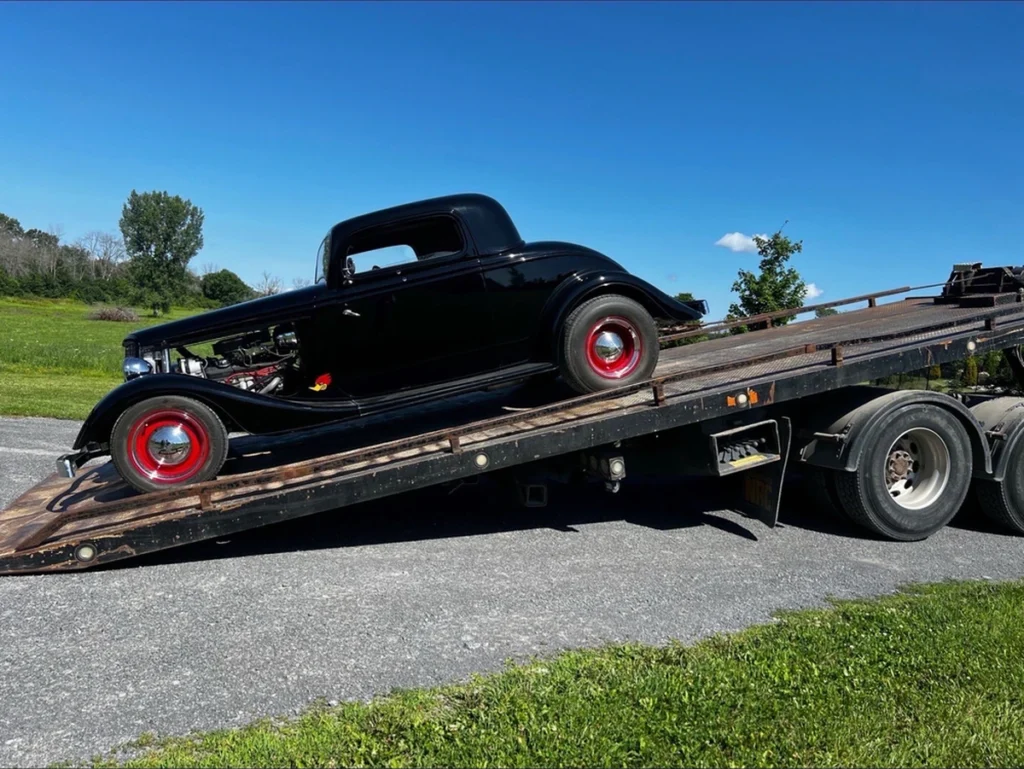Their dream machines hauled away, many vintage car owners in Ontario are suddenly in limbo amid a police probe into alleged auto theft.
Their dream machines hauled away, many vintage car owners in Ontario are suddenly in limbo as a police probe into alleged auto theft reaches across the province from its southwest. Dale Carruthers reports.
THE TOW-AWAYS
The last two months have been an “emotional roller-coaster” for Jackie Leroux-Vandecamp and her husband.
The Woodstock couple learned in mid-September that their cherished 1968 Cadillac Deville, which they bought two years earlier, had been reported stolen from a Southwestern Ontario auto dealership and that they would have to forfeit the dream machine to police.
The couple paid a seller in Scotland, southeast of Woodstock, $18,000 for the big four-door sedan, coloured fire mist gold with a black interior, and spent more than $30,000 fixing it up, Leroux-Vandecamp said.

In disbelief, they watched on Nov. 3 as their sweet ride was taken away by a driver sent by a Sarnia-area car dealer whom police say is the Caddy’s rightful owner.
“You’re sick to your stomach,” Leroux-Vandecamp said of the feeling she had, as they handed over the keys to the car.
“My husband was very mad. He was very quiet.”
Leroux-Vandecamp, 50, is among dozens of people across Ontario who have had to turn over their classic cars since the summer, in the fallout of an auto theft investigation involving vintage vehicles reported stolen from Grogan Classics, a car dealership in Watford, a community east of Sarnia.
Many of the motorists had owned their vehicles for years, sinking a lot of time and money into restoring them to their former glory.

Leroux-Vandecamp’s dream of owning a classic Cadillac turned into a nightmare in September after she read a news story about Mona Evoy, 51, whose 1934 Ford Coupe replica was seized as part of the police probe into the alleged large-scale theft of classic vehicles.
She recognized the name of a man charged in the case, Gary Leblanc, and immediately retrieved her used vehicle information package, a document that lists the vehicle’s past owners and whether any liens have been placed on the vehicle. The information showed that Leblanc had been the owner before the man in Scotland, Leroux-Vandecamp said.
Leroux-Vandecamp, who happens to work at an auto dealership, ran her car’s vehicle identification number (VIN) through the Canadian Police Information Centre database and it came back as reported stolen, she said.
A sinking feeling overcome Leroux-Vandecamp.
“I already knew that the cars were being repossessed. I already knew that insurance wouldn’t cover it, because the cars were (reported) stolen,” she said.
THE CHARGES
The OPP began investigating late last year after a resident of Lambton County, in Southwestern Ontario, reported multiple vehicles stolen. That led investigators to search a property in Stirling, a community north of Belleville in eastern Ontario, where they seized 45 vehicles, including classic cars, worth $3 million on May 14, police said at the time.
Robert Bradshaw, 54, and Leblanc, 55, both of Stirling, were charged with motor vehicle theft valued at more than $5,000, fraud worth more than $5,000, using forged documents and conspiracy to commit an indictable offence.
Court documents allege the men stole “numerous motor vehicles” from Larry Grogan, the owner of Grogan Classics, between Jan. 1, 2020, and May 9, 2024, and used “deceit, falsehood or other fraudulent means” to fraudulently obtain replacement ownerships.
Bradshaw is additionally charged with uttering threats to cause bodily harm to Grogan in September and allegedly defrauding Todd Schwindt out of $365,000 in April, the documents say. Schwindt, the owner of EG Auctions in Sylvan Lake, Alta., declined comment.
Bradshaw was arrested again last month and charged with breaching a release condition by allegedly communicating with Leblanc on Sept. 14, court documents say. Bradshaw was released from custody and ordered not to be at auto auctions or car sales unless accompanied by his surety.
Some of the people who unknowingly bought the vehicles authorities now allege were stolen received a letter from the OPP ordering them to turn over the cars or risk facing a criminal charge.
“You may be in possession of what appears to be a valid ownership for the vehicle. The person who sold you this car fraudulently obtained the ownership to the vehicle. This invalidates the ownership document you have,” said the letter from OPP Det.-Const. Tim Symington, one of the lead investigators on the case.
The letter mentioned that Bradshaw and Leblanc face fraud-related charges, and asked the vehicle owners to provide copies of cheques or bank transfers proving they bought their vehicles to establish the amount of their loss and have a chance at restitution.
Investigators have charged two more people since September. Michael McCrory, 58, and Charlotte Johnston, 53, are jointly charged with the same theft- and fraud-related offences as Leblanc and Bradshaw. The cases of all four accused, none of whom has yet entered plea, remain before the courts in Belleville.
THE FACEBOOK GROUP
In the fallout of the police investigation, the people whose vehicles were seized started a Facebook group, where users share their experiences, post photos of their vehicles being taken away and vent about the system they say left them out tens of thousands of dollars.
Mona Evoy, the administrator of the group that has 2,300 members, has become an advocate for those whose vehicles were seized.
The eastern Ontario woman said she and her husband Wayne visited Bradshaw’s property in Stirling, where dozens of vintage cars were stored, in the summer of 2021 after being referred to him by a friend. She said they paid $30,000 for a 1934 Ford Coupe and Bradshaw had the vehicle delivered to their home in Napanee.
Wayne and Mona Evoy received a letter from police informing them a 1934 Ford Coupe they bought in 2021 had been reported stolen and the couple would have to return it. (Postmedia Network file photo)
The couple bought the used vehicle information package – required when purchasing a used vehicle in Ontario – and Bradshaw turned over to them a copy of the ownership that listed Gary Leblanc as the owner, Evoy said.
“He said, ‘Oh, don’t worry about that, he’s my driver,’” Evoy said Bradshaw told them. “It was kind of weird. We didn’t question it . . . There’s lots of things we look back on in hindsight.”
An OPP officer showed up at the Evoys home in July, saying their vehicle had been reported stolen and the couple began making arrangements with police to surrender it, Evoy said.
Both Evoy and Leroux-Vandecamp said they were given the option of buying their vehicles back from Grogan, but didn’t pursue that after they could not reach a deal on price.
“It was your vehicle, and you shouldn’t have to buy it back,” Leroux-Vandecamp said in frustration.
THE DEALER
Grogan has become the target of criticism on the Facebook page that Evoy administers, prompting his lawyer to send a cease-and-desist letter to the Evoys, accusing them of publishing libelous statements.
The letter from London-based lawyer Paul Downs, obtained by The London Free Press, demands the Evoys stop making “derogatory statements” about Grogan and his dealership and remove existing comments on the Facebook page.
In the letter, Downs wrote “the fact that your purchased your vehicle” from someone now facing charges “does not give you the right to libel our clients. Ask your lawyer.”
Grogan declined an interview request and directed all inquiries to Downs, who didn’t respond to attempts to reach him by phone and email.
An OPP spokesperson didn’t respond to a Free Press interview request. The OPP have been tight-lipped about the investigation since putting out an initial release on the case, refusing to say how many vehicles have been reported stolen and how many have since been recovered.
In October, the Petrolia Independent reported that Downs said 208 cars were reported stolen from Grogan and that more than 150 remained missing.
Police, meanwhile, continue seizing vehicles linked to the case across Ontario and at least one in Quebec, according to updates on Evoy’s Facebook group.
“It’s my turn,” Quebec resident Denis Ro Dodindon wrote in a post Tuesday under a photo of a vintage coupe on a flatbed truck.
Dozens of comments quickly poured in on the Facebook page from users offering words of support and expressing shared frustration.
AUTO THEFT 101
Auto theft is a growing problem across Canada, where one vehicle is stolen roughly every six minutes. That’s an estimated 90,000 vehicles a year, with about $1 billion in costs to insurance policyholders and taxpayers, according to the Insurance Bureau of Canada, an industry umbrella group.
Wayne and Mona Evoy’s 1934 Ford Coupe sits on a car hauler. The couple surrendered it to police because it had been reported stolen. (Supplied photo)
Classic cars account for only a small fraction of the vehicles stolen each year, but they’re valuable and difficult for police to track because they don’t have as many identification features as newer vehicles, experts say.
In response to the surge in auto thefts, provinces and the federal government have pledged millions of dollars to combat the crime and many police forces, including the OPP, have created special auto theft units.
TAKEAWAYS
People having to turn over to police vehicles they thought they owned is a cautionary tale about the risk of buying from private sellers, said Bryan Gast, the vice-president of investigative services at Équité Association, a non-profit organization representing Canadian property and casualty insurers.
“It’s a horrible story,” Gast said of those who unknowingly bought vehicles later reported stolen.
Had they bought from a licensed dealer registered with the Ontario Motor Industry Vehicle Council, the industry regulator, they would have been eligible for compensation, Gast said.
Gast, a former OPP officer, noted safeguards to protect buyers, such as the used vehicle information package, wouldn’t have helped in this case.
“It’s tough to come up with lessons learned from this thing, because they did a lot of the things right,” he said of the buyers who had to surrender their vehicles.
For Evoy, Leroux-Vandecamp and others like them, who had to give up their vehicles, going to court to sue is still an option to recoup their losses. But they say lawyers have told them they’d have to wait until the criminal case is completed, a process that could take more than a year.
“We’re the ones being kicked to the curb by everybody,” Evoy said.
“We are the ones who have lost our money and our cars and the memories that we have made in those cars . . . It just goes so far beyond a dollar amount.”
News
Ella Langley is taking social media by storm with her daring photos.
Country Music Star’s Bra Photos Have The Internet Talking: PICTURES Ella Langley’s generation run isn’t slowing down. The country music sensation has been tearing up the industry over the past year, and she has zero intention of slowing down. If anything, she plans…
Blake Shelton Reveals One Of The Worst Mistakes Of His Life
Blake Shelton has told us one of the worst mistakes he’s ever made in his life, although it’s now a permanent part of him. Life is full of regrets, and no matter who you are, you’ve had some. Blake Shelton has shined…
Tim McGraw is ready to make your dreams come true with the Field Of Dreams concert
Tim McGraw Is Making Fans’ Dreams Come True With Field Of Dreams Concert Tim McGraw is ready to make your dreams come true. The country icon is set to become the first artist to headline a concert at the Field Of Dreams movie…
REPORT: Angry viewers call for boycott of Underwood’s debut as judge on American Idol
Carrie Underwood’s Inauguration Performance May Backfire With ‘American Idol’ You surely know about the fierce pushback that Carrie Underwood’s performance at President Donald Trump’s inauguration touched off from the moment it was announced. Some disgruntled fans have apparently renounced Underwood altogether. They believe…
Wallen announces upcoming album and 2025 stadium tour with Ella Langley, Miranda Lambert and huge star line-up
Morgan Wallen Announces New Album and 2025 Stadium Tour With Ella Langley, Miranda Lambert, and More Morgan Wallen had quite the controversial 2024, however, despite the adversity, the man keeps on chugging along. Today, January 24, Wallen announced his upcoming…
Paige Spiranac Could ‘Make’ Tiger Woods’ New Golf Tournament ‘More Exciting’
Tiger Woods ‘Needs Help’ From Golf Influencer Paige Spiranac Tiger Woods’ new golf league, TGL, launched its debut season earlier this month. The league, which features a state-of-the-art golf simulator, with a real putting green and multiple sand bunkers, is comprised of…
End of content
No more pages to load











